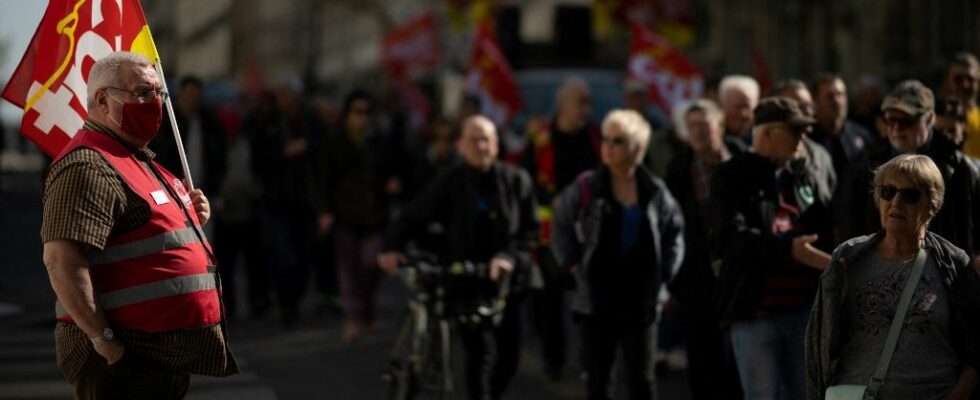Pension reform and social tensions… This is the menu for this winter of 2023. On the occasion of the first day of inter-union mobilization against the postponement of the legal retirement age, several sectors will be paralyzed by strikes. Thousands of people are expected in the first large-scale demonstrations since the re-election of Emmanuel Macron.
Less than 48 hours from an unprecedented mobilization for ten years – the unions having not formed a common front since 2010, during a previous pension reform – 20 minutes comes back to the disturbances sector by sector.
The teachers at the rendezvous
If you were planning to leave your children at school this Thursday, watch out for the striking teachers. According to Guislaine David, general secretary of SNUipp-FSU, the first primary union, 70% of kindergarten and elementary teachers will strike. “We can ask ourselves the question of the hardship in the teaching profession. Because if we work until 64, 65 or even 67, we can wonder what state we will be in, ”explained the trade unionist on Tuesday. In Paris, the SNUipp-FSU provides Thursday that at ” less than a third of schools » be completely closed.
Heavy disturbances are also to be expected in colleges and high schools, even if the rate of strikers is not yet known, secondary school teachers not being obliged to report their absence 48 hours in advance. Blockades of establishments by high school students are also likely to be organized, as requested by several organizations on social networks.
Transport at a standstill
“It will be a rough Thursday, [accompagné] strong disruptions”, anticipated on France 2 the Minister Delegate for Transport, Clément Beaune, who invites to “telework when possible”. Whether at the SNCF or the RATP, few employees should report to their post Thursday morning. The Parisian transport unions are all the more upset that the government wants to abolish, in the long term, their special pension scheme, as it has already done for railway workers. On Tuesday, the RATP announced that traffic on its network will be “very disrupted”, with three metro lines completely closed (8, 10, 11) and ten lines “partially operated” or only operating during rush hours.
At the SNCF, the message of the inter-union made up of the CGT, Unsa, SUD and the CFDT is clear: “total opposition to the decline in the legal retirement age to 64 accompanied by an increase in contribution period. The four organizations “are ready to launch the necessary battle” and call in a press release “for a powerful strike” (and renewable) in the rail this Thursday.
Other federations are also calling for mobilization. FO-Transports and Logistics, which brings together truck drivers as well as ambulance drivers, coach drivers or fund carriers, wants to go “as far as possible in this fight”.
Some disruptions in the air are to be expected, according to a “notice for air missions” (NOTAM) published Tuesday afternoon by the DGAC: “airlines must reduce their flight program initially planned at the airport by 20% from Paris-Orly from 5:00 a.m. to 10:30 p.m. on January 19.
Strikes will complicate fuel supply
Long queues in front of petrol stations are to be expected. In refineries, TotalEnergies employees filed 24-hour notice on Thursday, then 48 hours next week and 72 hours in early February. More shortages than usual were observed at the start of the week, a sign of a possible fear of running out among some motorists.
The Minister of Labor, Olivier Dussopt, called for this mobilization “not to result in a blockage of the country”. Comments made on public broadcasting, whose programs should be largely disrupted on Thursday.
Exit civil service
The civil service inter-union called on “all public officials to mobilize […] massively” against the pension reform project deemed “unfair and unnecessary” during the day of strikes scheduled for January 19.
All police unions will also participate with their respective trade union centers in the demonstration. The majority union bloc (13 unions of police officers and technical, scientific and administrative personnel) led by Alliance-CFE-CGC and Unsa police called for participation in Thursday’s demonstration, with the slogan: “We do not touch the special status police officers “.
In hospitals, agents and caregivers will also be on the streets this Thursday, the unions having filed notices to this effect. “We don’t want to go from the hospital to the cemetery! We have given without counting our entire career as caregivers We have the right to take advantage of our retirement, we are not trying to live longer in nursing homes, ”we can read in a tweet from the SNPI, the nurses’ union.
Power cuts for elected officials in favor of the reform
Still in the energy sector, in addition to strikes, targeted cuts are being considered by the CGT Federation of Mines and Energy (FNME-CGT) against elected officials who will support pension reform, dividing the political class between the right which denounces “illegal methods” and the left which considers them non-violent.
The CGT Mines-Energie presented Friday a “battle plan” to obtain the “pure and simple withdrawal” of the government project. This plan provides for a “recovery of the working tool in all its forms”: “electricity and gas restorations to the most precarious, free energies, targeted cuts, production cuts”…

